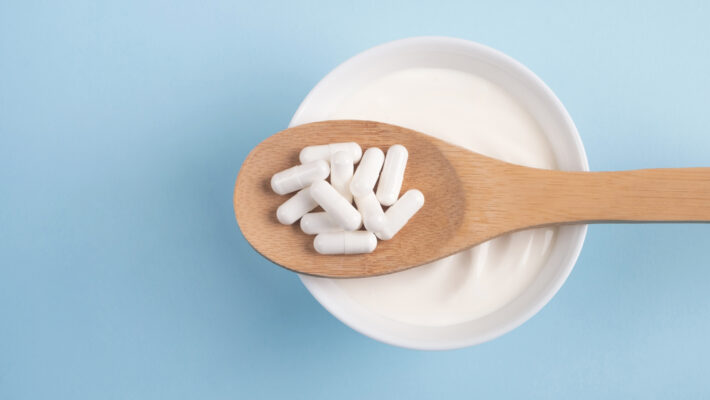
Probiotics: What You Need to Know
Probiotics support good digestive health. As such, probiotic supplements are popular choices for individuals who have gastrointestinal (GI) concerns and want to keep the gut (and immune system) as healthy as possible.
What Are Probiotics?
Probiotics (as dietary supplements) are live bacteria that are added to the existing bacteria which inhabits the human body (the microbiome). The “good” or beneficial bacteria help the bowel function properly and promote the growth of healthy bacteria within the GI tract. Good bacteria help the body produce vitamin B12, butyrate, and vitamin K2; and create enzymes that destroy bad bacteria. Also, good bacteria have been shown to stimulate the secretion of immunoglobulin A (IgA) and regulatory T-cells that help modulate (balance) immune function.
Individuals are first exposed to beneficial bacteria as soon as they are born. All mammalian newborns receive probiotics as they pass through the mother’s birth canal. Then, a series of events begins inside the baby’s GI tract that leads to the colonization or proliferation of good bacteria.
The optimal balance of good and bad bacteria is approximately 85% good and 15% bad, according to the American Nutrition Association. If this balance is disrupted and leans towards a higher percentage of bad bacteria, an individual’s gut health becomes compromised. This may lead to a number of health problems, including occasional constipation, diarrhea, weight gain, and skin issues.
Probiotic supplements have been shown to foster the growth of good bacteria. They contain common strains such as Lactobacillus acidophilus, Lactobacillus rhamnosus, Bifidobacterium bifidum, Bifidobacterium longum, and Bifidobacterium lactis.

Are Probiotic Supplements Necessary?
A lack of good gut bacteria may cause an individual to experience bowel or digestive issues. When these health issues become problematic, some people decide to incorporate probiotic-rich foods into their diets or use probiotic supplements.
There are many benefits to supplementing with probiotics, and these benefits include:
- Enhanced support against potential food-borne illnesses
- Improved vitamin B12 production for increased energy
- Healthy bowel movements
- Promoting a healthy immune system
Ultimately, an individual’s digestive health affects every physiological system in the body. People are frequently exposed to environmental toxins such as herbicides, pesticides, and organic solvents, as well as internal toxins that are the natural byproducts of cellular functioning and digestion. These toxins can negatively affect the digestive function and make it difficult for people to utilize nutrients and remove cholesterol from the body.
Are You Getting a Sufficient Amount of Probiotics?
Getting the right amount of probiotics can be tough. Here are some tips to ensure you get plenty of probiotics in your diet:
- Eat sour foods. Fermented vegetables, foods that contain apple cider vinegar, and other sour foods are great sources of probiotics. These foods often contain acetic and gluconic acids, healthy acids that support the growth of probiotics in the digestive system. Homemade fermented foods, such as sauerkraut and other vegetables, are better than store-bought canned varieties; canned foods are subjected to high heat during the manufacturing process which kills the natural probiotics.
- Incorporate raw or probiotic-enriched dairy into your diet. Raw cow or goat milk, kefir, yogurt, and raw dairy products are rich sources of probiotics. For example, adding a cup of kefir to a morning smoothie or snacking on yogurt during the day is a simple way for a person to increase his or her probiotic intake.
- Consume high-fiber foods. Chia seeds, flaxseeds, and other high-fiber foods offer a wide range of health benefits. In addition to being a top source of probiotics, these foods help feed the good gut bacteria, reduce cholesterol levels, and manage blood sugar levels.
Adding a daily probiotic supplement is also an effective way to get probiotics if probiotic food sources are not available or are not pleasing to an individual’s taste buds. But not all probiotic supplements contain the same ingredients. Therefore, the quality and effectiveness of probiotic supplements often vary.
When evaluating probiotic supplements, take a look at the specific bacteria strains indicated on the product label. The best probiotic supplements won’t necessarily contain the most bacteria (CFUs, or colony forming units); but they will contain a variety of bacteria strains. Read the label first to find out if the bacteria are alive or freeze-dried. If alive, be sure the label provides instructions for keeping them that way. Each bacteria strain in a probiotic supplement has a different function relative to the digestive system, so the goal is to select a supplement that contains multiple bacteria strains. A supplement containing a high concentration of only a small number of strains may be less effective overall.
At a minimum, you should choose a supplement that contains:
- bifidium: Helps the body break down carbohydrates, fat, and protein.
- longum: Helps the gut wall maintain its integrity.
- acidopilus: Helps the body absorb nutrients and digest dairy foods.
Keep in mind that a probiotic supplement is not a quick-fix solution to all of a person’s health problems, either. A single probiotic supplement offers no guarantees and is unlikely to deliver instant results. But an individual may be able to use a probiotic supplement in conjunction with regular exercise and a healthy diet.
If you are considering a probiotic supplement, you should consult with a doctor, too. A doctor can perform a medical evaluation and help you determine if a probiotic supplement is necessary based on your health. Plus, a doctor can offer tips and recommendations to help you safely incorporate a probiotic supplement into your diet.
This article was brought to you by Sovereign Laboratories, a world leader in the development of liposomal delivery to maximize the bioavailability of our dietary supplements.



